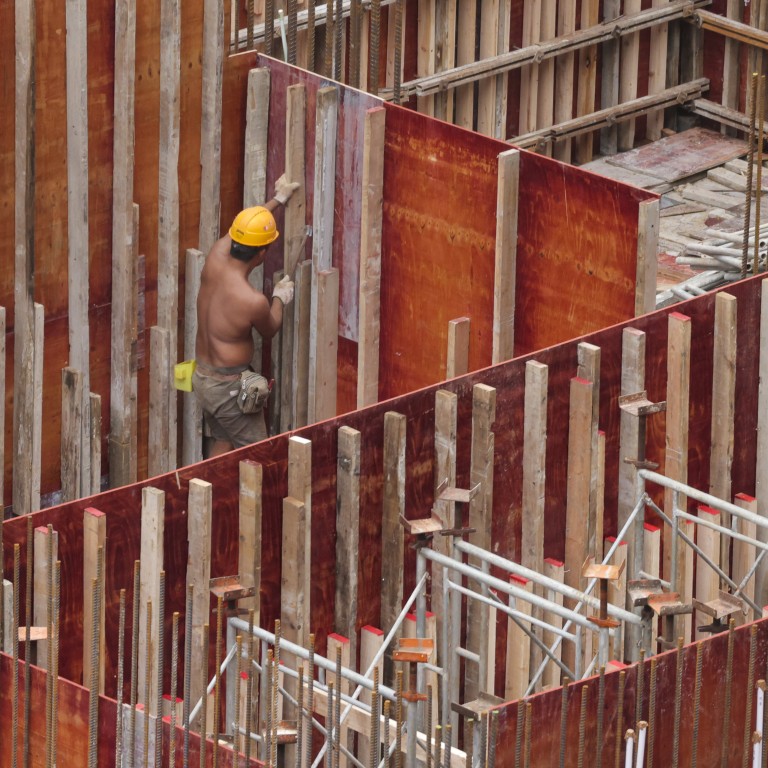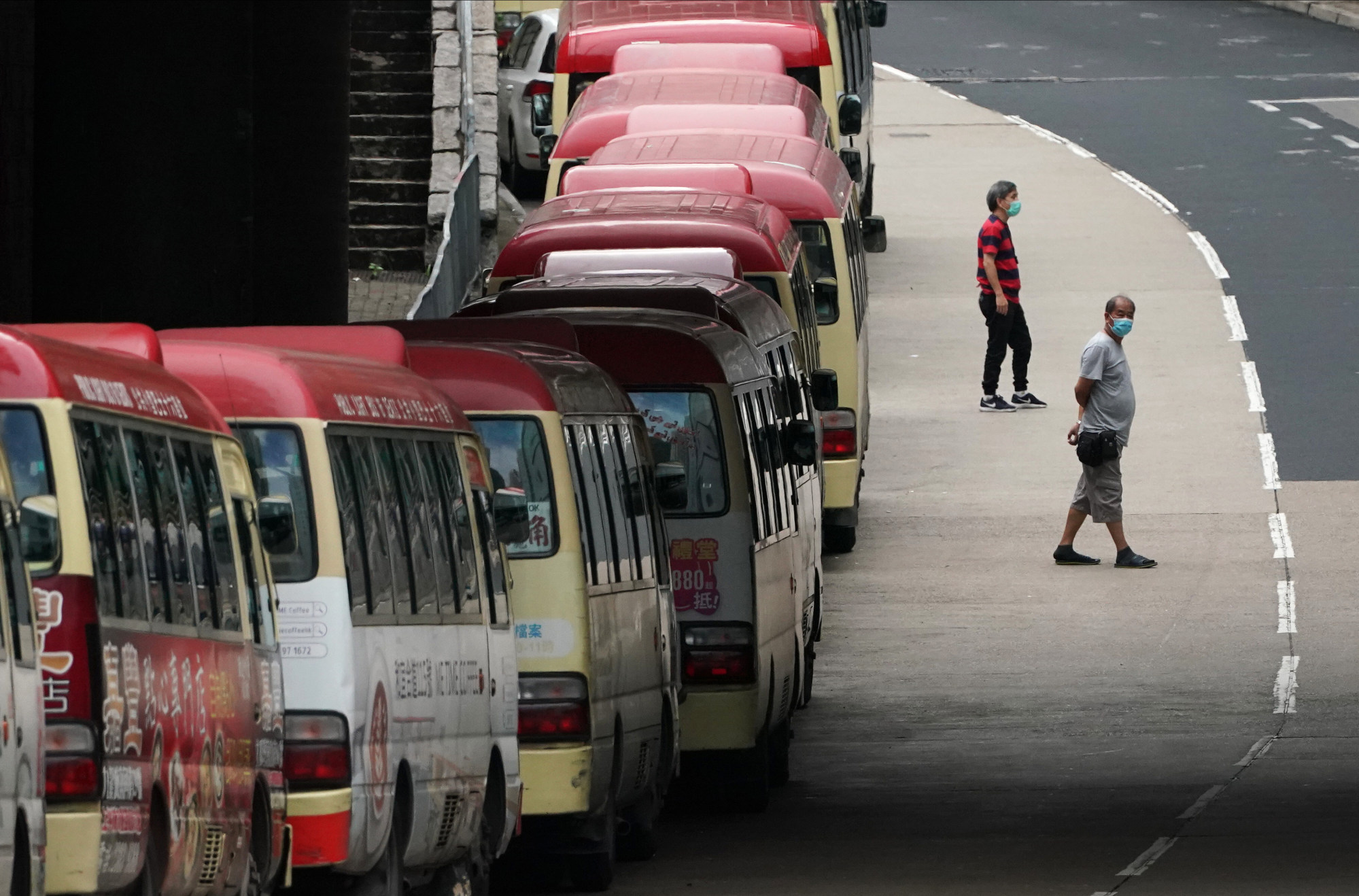
Hong Kong must import workers if labour crunch persists, John Lee says, with ‘construction, transport sectors set to get 10,0000 slots in quota system’
- Chief Executive John Lee also promises to protect the interests of local workers when introducing policies to import labour
- Two sources say quota for construction and transport sectors may be up to 10,000 workers depending on negotiations with unions
Hong Kong’s leader has said it will be “necessary” to import labour if local recruitment fails to ease a manpower crunch, with sources revealing the construction and transport sectors, seen as the top priority, may be given thousands of slots under a quota system for workers.
Underlining the severity of the shortages, Hong Kong last year suffered the biggest drop in its working population since records began in 1985, losing more than 94,000 employees.
That brought the total number of workers who quit the labour force in the past four years to 220,500.

Lee was commenting on a controversial plan to allow thousands of non-local construction workers into the industry under new measures that would strip the Labour Advisory Board of vetting power, similar to a scheme introduced earlier to solve staff shortages in care homes for the elderly.
“If shortages cannot be eased even after training, simplifying work procedures, and implementing initiatives to recruit local workers, measures will be necessary to ensure there is a sufficient workforce to provide services to residents,” Lee said ahead of the weekly meeting of the government’s key decision-making Executive Council.
He said various bureaus were assessing the seriousness of the shortages.
Lee said the building and transport industries were a priority, citing a Construction Industry Council report that forecast a shortage of about 15,000 workers next year.
He warned that a labour crunch would directly affect residents’ daily activities and the city’s competitiveness, but stressed that policies to be announced would take into account the impact on the local workforce.
Record drop in Hong Kong labour force as 94,000 workers call it quits in 2022
“[We will] protect local employment … guaranteeing that salaries of imported workers cannot be lower than the median income of the relevant industry. This has been our established policy,” Lee said.
Two separate sources told the Post the government had estimated the transport and construction industries could follow the new importation measures used in the scheme for carers, and the quota could be as much as 10,000 workers depending on negotiations with unions.
One source admitted the 10,000 figure was preliminary as the issue would eventually become a tug of war between authorities and unions.
It was understood the relevant bureaus had been in contact with unions in the past two months hoping to reach a consensus, but had experienced great setbacks.
The source added that it was hoped the importation plan, which allowed relevant bureaus to decide on the need for workers without going through the Labour Advisory Board, could start in the second half of the year.

A labour sector source who had taken part in talks with the government said construction workers were in short supply the most, while the transport sector could still manage to find youngsters if employment conditions improved.
The source said sectors such as catering and tourism also hoped to take advantage of the importation of workers.
Hong Kong Taxi and PLB Association chairman Chau Kwok-keung said the government had promised to import 500 minibus drivers from mainland China by the middle of this year to resolve acute manpower shortages in the industry.
“We desperately need imported labour. The industry is suffering from a severe lack of minibus drivers, over 2,000, and an ageing workforce with no young blood wanting to join this trade,” he said. “If there is no imported labour, this industry can’t survive.”
Drop in Hong Kong birth rate prompts warning over future workforce
Chau noted that although around 168,600 people held a minibus driving licence, only about 12,000 of these were active, including many aged over 70 years.
He said the imported drivers would be paid in line with their local counterparts, earning between HK$14,000 and HK$19,000 a month.
“It is expected the imported labour will be exempted from having a local driving licence but they will be given at least one day’s training to get accustomed to the local routes,” he said. “I know some unions may be unhappy about this arrangement but they need to calm down and try to understand our plight.”
But unionists said importing labour should be a last resort.

Ng Wai-leung, rights and complaints officer at the Hong Kong Construction Industry Employees General Union, said: “The priority should be strengthening vocational training and rolling out construction projects in an orderly manner so as not to overstretch the manpower supply.”
Chan Fung-yuen, chairman of the Public Light Bus Branch of the Motor Transport Workers General Union, told a radio programme that authorities should instead work with the trade to raise drivers’ hourly wages from around HK$50 to HK$80.
“Higher wages and more rest periods will naturally attract young people to join us … Importing drivers is just breaking the rice bowls of local drivers,” Chan argued, estimating the industry was short of 300 workers.
The Democratic Alliance for the Betterment and Progress of Hong Kong (DAB) threw its weight behind the proposal to import workers, but the mechanism should only be triggered when the industry failed to hire sufficient workers locally for six months, even with on-the-job training subsidies from the government.
Losing them young: Hongkongers in early 20s are biggest emigrating group
“We wish employers could import workers through a simplified procedure of no more than three months, and the workers should be entitled to a maximum two-year contract, which can only be renewed once,” DAB lawmaker Frankie Ngan Man-yu said.
“The decision-making power in approving the importation of workers should be handed to the minister for the relevant industry, instead of the labour chief alone, and employers should hire them with an above-median salary offer.”
The party called on the authorities to lift a ban on importing workers in 26 job categories, including hairstylists, cashiers and waiters, among others.
It also urged the Labour Advisory Board to come up with a list of trade facing shortages subject to annual review, and estimate the numbers, so the government could provide on-the-job training subsidies accordingly.
Additional reporting by Cannix Yau



